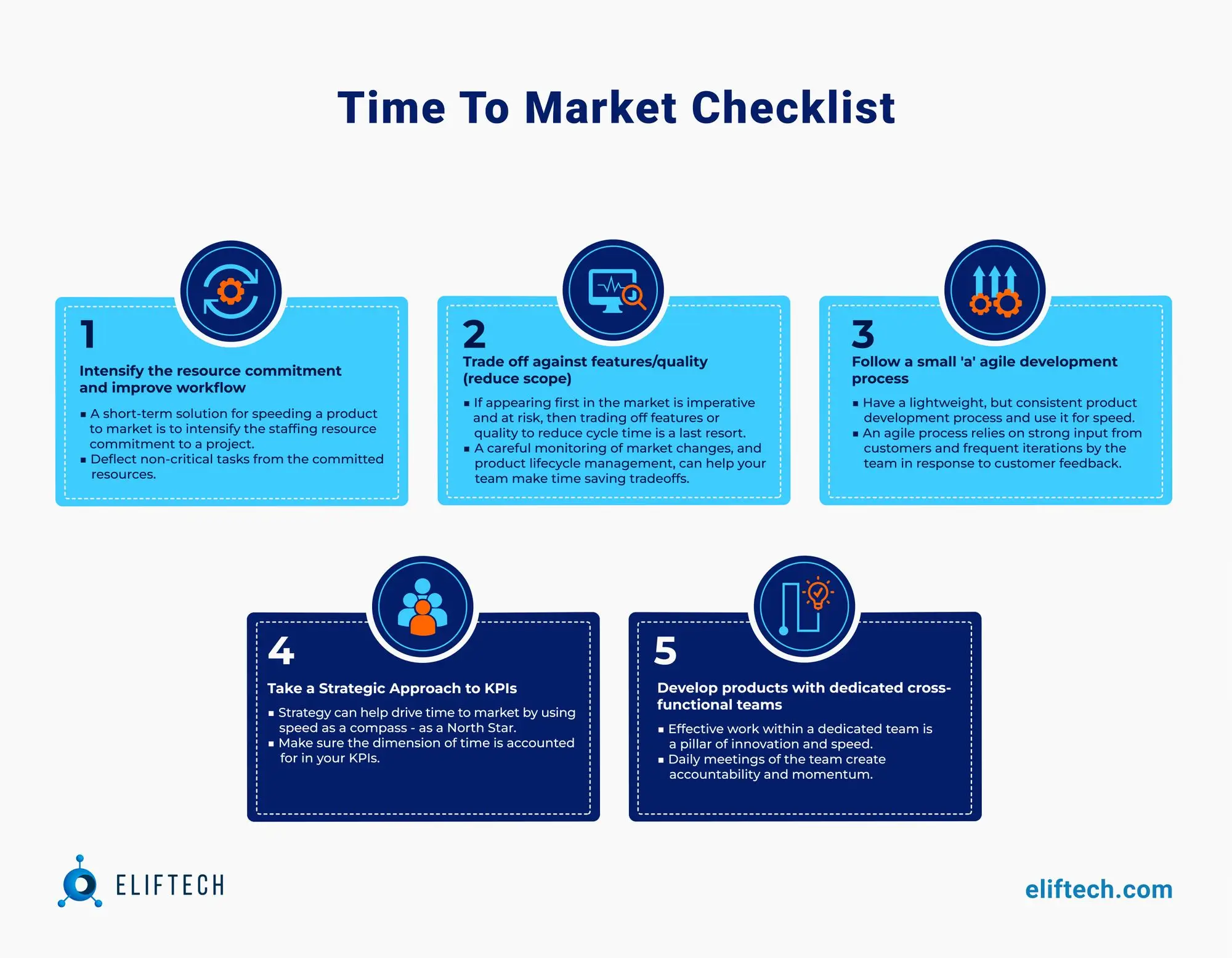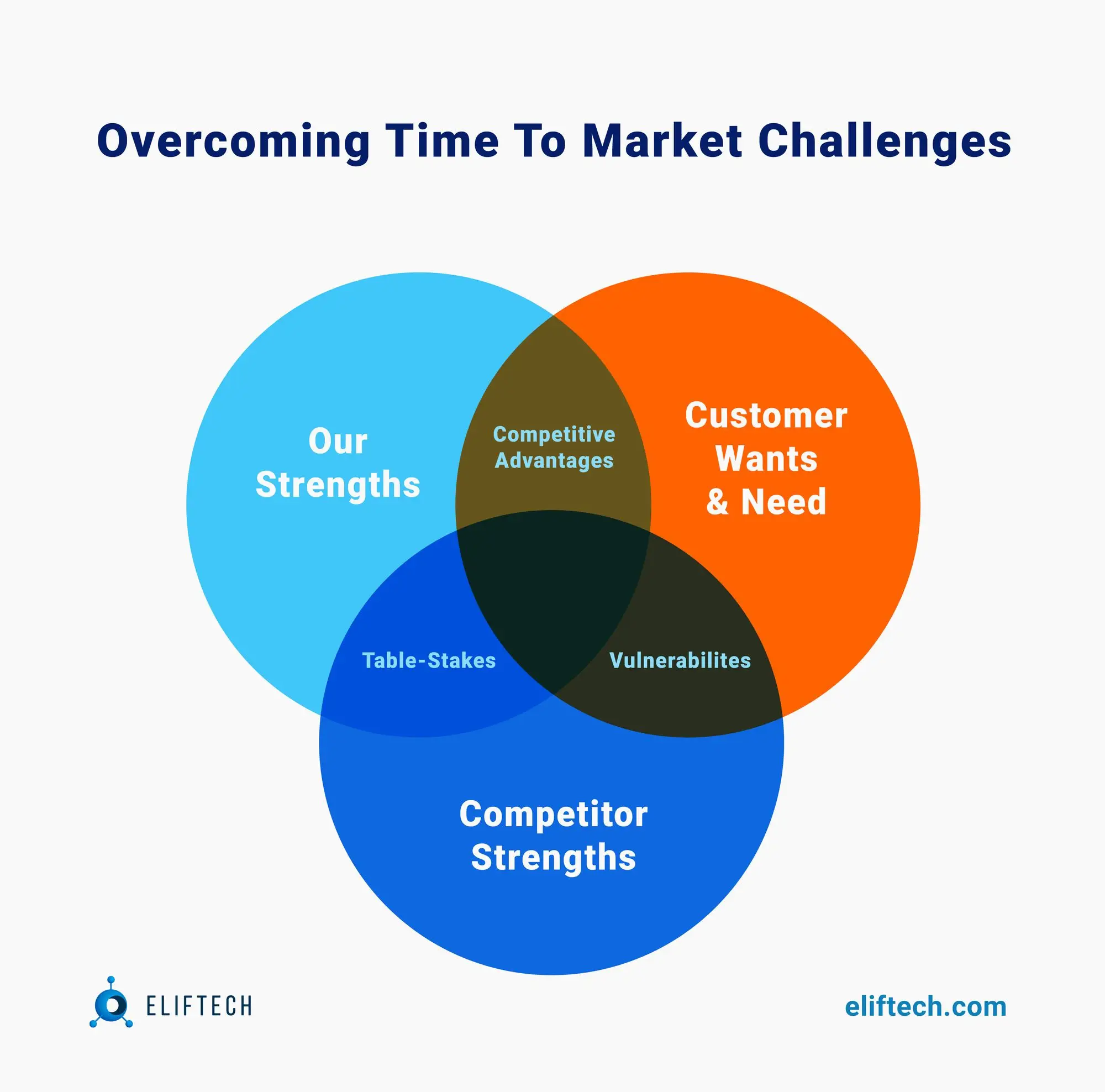Startup
The Startup Guide to Faster Time to Market & Why It Matters

In the fast-paced world of startups, time is a precious resource that can make or break a business. The ability to bring your product or service to the market quickly is crucial for achieving success.
This is where the concept of Time to Market (TTM) comes into play.
Achieving Startup Growth with Faster Time To Market (TTM)
Time is particularly critical in development, where every minute impacts the budget. For startups, TTM is the turning point where revenue generation begins and the business starts working for you.
In our next guide, you will learn hacks for faster time to market, find out why a company can make calculation mistakes, and learn how to keep up with the schedule. Ready to find out more?
Understanding the Concept of Time To Market
Globally, Time to Market (TTM) is the time it takes to go from an idea to a finished product. Sometimes you will come across the term Speed to Market (STM). In the context of startups, TTM is a critical metric that influences the potential success of the business. The shorter the TTM, the more resilient the startup is against the competition and market changes. The main difficulty is that each participant affects the result and duration.
The main stages of TTM include:
- Idea generation
- Design
- Development
- Market launch
TTM is particularly important in situations involving high-end product costs, rapid innovations, and periods of economic volatility. However, it is crucial to ensure that quality remains consistent, regardless of the strategies used to expedite the delivery process.
This metric is used both during the developing of a completely new product (NPD) and during the implementation a new product or feature (NPI). Understanding the product release dates allows you to correctly plan your marketing strategy and further steps to improve and/or refine the product.
TTM consists of two key steps:
- "The clock is running" - the main risks have been eliminated, and the team is ready to start.
- "The clock stops" - The MVP or the product's first version is ready to launch.
Thus, the main components of TTM are the balance of decision-making, change, self-efficacy, and the processes of making changes.
The Significance of Time to Market for Startups
In the startup ecosystem, it is crucial to achieve quick returns on investment due to limited resources and the inherent risk of failure. Reducing TTM can lead to substantial cost savings. For example, by shortening the development time of a software solution, you can save on IT specialists' salaries and allocate those resources to expand your business strategy.
Competitive Advantage
A well-defined strategy enables startups to gain a competitive edge through a shorter TTM. This can be achieved in several ways, such as:
Immediate Customer Feedback
By launching a Minimum Viable Product (MVP) with only the essential features, startups can gather valuable customer feedback early in the process. This feedback can be used to refine and improve the product, ensuring that each new feature aligns with customer needs.
Early Market Entry
Entering an untapped market niche quickly increases the likelihood of becoming an industry leader. By being the first to market, startups can build brand awareness, establish themselves as thought leaders, and capture market share before rivals join the fray.
Increased Agility
In today's volatile market conditions, the ability to adapt to change is crucial. A fast product launch allows startups to better understand their market and respond to changes more swiftly.
Funding and Investment
Attracting investors is another crucial reason to prioritize TTM. Venture capitalists tend to favor startups with a clear plan for bringing their product to market quickly. A lengthy TTM can be a red flag for stakeholders, signaling inefficiency or a startup's inability to execute its plan.
How TTM is Driving Startup Growth
The primary purpose of the concept is to do everything so that all the preparatory stages for the product bring in money. Startups need to be able to reduce time to market, which means saving resources and getting the product to the consumer faster. For example, it could reduce development time by creating an MVP or using different platforms.
The longer you wait to release a product, the longer your prospects won't pay you, and the greater the risk that your competitors will overtake you. The cost of delay (CoD) metric is critical for startups and tech giants. In this case, the potential cost of a late release is quantified, considering the impact on revenue, customer satisfaction, and other critical business factors.
One good miscalculation case is Microsoft's release of Windows Vista. The development of the version took five years due to constant improvements and changes; all this led to the fact that market opportunities were missed, and the resulting product, after such a long wait, needed to meet the requirements and had several compatibility problems. Exciting and the fact that much loved by many Windows 7, Microsoft was able to release just two years later successfully.
11 Go-to Strategies for Faster Time to Market

So, we have decided on the importance of faster time to market; now, we will consider the steps to speed up the product's entry into the market. All approaches can be divided into marketing and technological ones. Let's consider them separately.
Faster Time to Market: Marketing Side
- Create a detailed roadmap. About 90% of startups fail due to the need for a clear development plan. The roadmap should include everything down to the technology stack and action plan in case the most common fails, so you’ll improve time to market.
- Know your goals. It's about the potential revenue you expect after the product's release. With a clear financial goal, a business can be considered efficient. As a startup owner, you must clearly understand how much was invested in the product at each stage and how it will be monetized.
- Outsourcing is your friend. Sometimes you need to speed up development; you will need the expertise of a narrow specialist, or you will need to integrate a ready-made solution, in which case you can save money by hiring an outsourcing company or a specialist for a specific task pool. This will allow you to get what you need within the specified time frame with less investment and a guaranteed result.
- Expand your network. Your product must interest people even before it sees the light of day. In addition to attracting potential customers, you will also be able to get additional investors. You also share the risk by transferring the investment, reducing your operational burden.
- Automation and planning are the foundation. Each team member must clearly understand their role and why they are here. All this stems from the analysis and step-by-step planning of the development and launch processes of the product. The workflow should be detailed with areas of responsibility and goals for each stage. After drawing up a plan, you can search for optimization and automation options, selecting the best tools.
- Analyze that. It is not enough to plan everything; analyzing what it led to is essential. Intermediate and final results of each stage of work help to identify problems and errors and solve them quickly without harming the main processes. At the same time, it is essential to remember that all goals and their path must be transparent and understandable to everyone.
Thus, TTM acceleration is based on analysis and planning, which give an understanding of what, at what stage, and in what way can be improved.
Faster Time to Market: Technical Side
- Innovation is good. Only with new technologies can progress and improvements in the development approach be made. A striking example is ChatGPT, which did not replace employees but significantly optimized their work while reducing costs. Businesses should not be afraid of technology; they should strive for it.
- Reliable technology partner. Choosing a reliable technology partner is crucial for achieving successful outcomes. It is essential to ensure that the vision and expertise of the development company align with your specific needs. Take the time to thoroughly review their portfolio and have in-depth conversations with potential partners before making a decision.
- Apply agile practice.Agile development and the division of tasks into sprints help you quickly adapt to and respond to changes. This speeds up the development process, reduces the risk of delays, and improves the quality of the final product.
- Implement DevOps practice. The use of DevOps methodology allows you to optimize and automate tasks significantly, speeding up deployment through the use of CI / CD. DevOps expertise can be your lifeline and significantly reduce development time.
- Start with an MVP. Starting from the basic version of the product, you get an understanding of what you will get as a result and what problems your user may encounter. MVP is the best option to get quick feedback and test all business hypotheses. Another indisputable plus is the opportunity to receive additional investments.
Overcoming Time To Market Challenges

Despite the specifics of each product, most of the problems on the way to market can be categorized to simplify the solution.
Among them:
- misunderstanding of the tasks and specifics of the target audience;
- poor understanding of the marketing goals of the product;
- the team does not understand its duties and roles;
- lack of shared vision among investors and founders.
There can be problems at each stage, which brings us to the idea that it is extremely important to analyze and make a mistake at each step.
Conclusion
Time to the market is a critical factor that should be at the heart of your planning. Feel free to change or supplement the strategy if the current approach has several problems or needs to work out.
The Eliftech team has collaborated with many startups; therefore, we can clearly understand their pain points and problems. At ElifTech, we focus on long-term, productive partnerships and offer a comprehensive approach to product development. And we always start by analyzing the situation and pointing out possible issues that hinder the process. Business owners need to be clear about what they need to achieve to be successful and how they can measure success.
Unsure how long it will take to turn your idea into a product? We know how to calculate it.
Contact us today to discuss your project and achieve faster Time to Market under our guidance.
